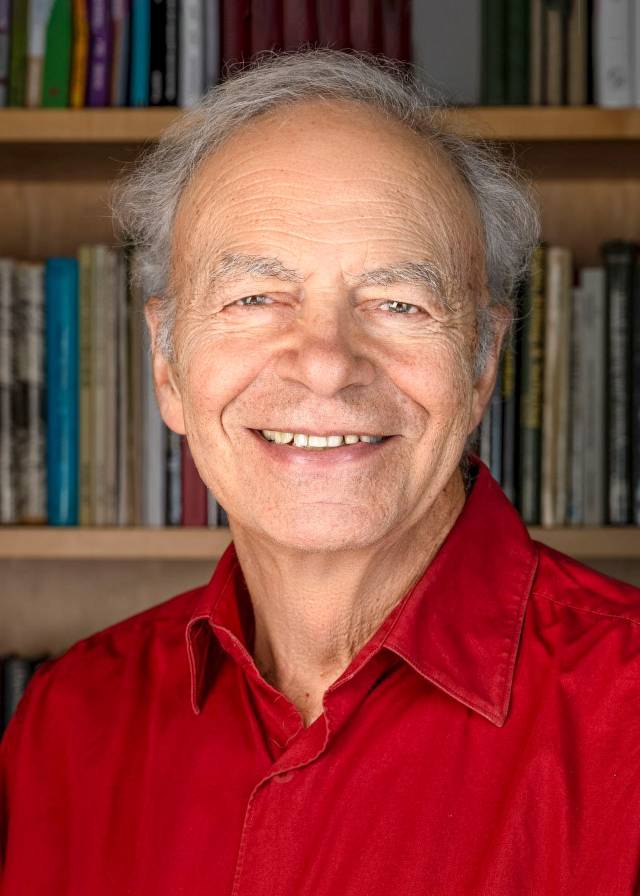
William Bialek

Princeton faculty members William Bialek, Kai Li, Peter Singer and Christopher Skinner have been elected to the American Academy of Arts and Sciences for distinguished work in their disciplines.
They are among the leaders in academia, the arts, industry, policy, research and science who were elected to the academy this year. They will be inducted at a ceremony in October in Cambridge, Massachusetts.
“These new members’ accomplishments speak volumes about the human capacity for discovery, creativity, leadership, and persistence,” Academy President Laurie L. Patton said in a press release. “They are a stellar testament to the power of knowledge to broaden our horizons and deepen our understanding.”

William Bialek
Bialek is Princeton’s John Archibald Wheeler/Battelle Professor in Physics and the Lewis-Sigler Institute for Integrative Genomics. He also co-directs the Center for the Physics of Biological Function and directs the Program in Biophysics.
His research sits on the border between physics and biology. He is best known for work demonstrating that some living systems come very close to the limits of what is allowed by the laws of physics. More generally, he is interested in finding theoretical principles that encompass the complexity and diversity of life. He examines living systems at scales from single molecules to cells to brains to flocks of birds.
He received his A.B. and Ph.D. in biophysics from the University of California-Berkeley, and he came to Princeton in 2001. His previous honors include a 2021 Guggenheim Fellowship, the 2018 Max Delbrück Prize in Biological Physics from the American Physical Society, the 2006 President’s Award for Distinguished Teaching, and the 2013 Swartz Prize for Theoretical and Computational Neuroscience from the Society for Neuroscience. He is a fellow of the American Physical Society and a member of the National Academy of Sciences.

Kai Li
Li is Princeton’s Paul M. Wythes ’55 P’86 and Marcia R. Wythes P’86 Professor in Computer Science. He is also one of 10 core faculty at the Princeton Precision Health initiative.
He was an early advocate for using compute clusters for parallel computing and developed the first system supporting shared-memory programming on clusters. He also led the creation of user-level communication mechanisms that helped shape modern data center networking. In storage, he pioneered data de-duplication for efficient backup and replication. In machine learning, he contributed to ImageNet, the dataset that propelled the deep learning revolution. His recent research interests include machine learning for systems, privacy preservation for machine learning, data auditing, and computational biology and neuroscience.
He completed his Ph.D. at Yale University in 1986 and joined Princeton’s faculty the same year. Li has received eight most influential or test-of-time paper awards. He has been elected as a fellow of the Association for Computing Machinery, a fellow of the Institute of Electrical and Electronics Engineers, and a member of the National Academy of Engineering.

Peter Singer
Singer is the Ira W. DeCamp Professor of Bioethics in the University Center for Human Values, Emeritus. He was also associated with Princeton’s High Meadows Environmental Institute, the Center for Policy Research on Energy and the Environment, and the Department of Philosophy.
He is a renowned philosopher best known for his work in applied ethics, particularly regarding the ethical treatment of animals and the alleviation of poverty. He has written or edited more than 50 books, including “Practical Ethics,” “Animal Liberation Now,” “Ethics in the Real World,” and most recently “Consider the Turkey” from Princeton University Press.
Singer earned bachelor’s and master’s degrees from the University of Melbourne and his B. Phil. from the University of Oxford. He is the founder and board chair of The Life You Can Save, a nonprofit working to reduce global poverty. He joined the Princeton faculty in 1999 and transferred to emeritus status in July 2024.
Among his many awards and honors are 2021 Berggruen Prize for Philosophy and Culture and the 2023 BBVA Foundation Frontiers of Knowledge Award in Humanities and Social Sciences.

Christopher Skinner
Skinner is Princeton’s Henry Burchard Fine Professor of Mathematics.
His research focuses on algebraic number theory, arithmetic geometry and arithmetic aspects of the Langlands program. He has collaborated with many other notable mathematicians, including Andrew Wiles, Eric Urban, Manjul Bhargava and Wei Zhang.
Skinner received his Ph.D. in 1997 under Wiles’ mentorship and then joined the Institute for Advanced Study. After teaching for six years at the University of Michigan, he joined the Princeton faculty in 2006.
His past awards include a Packard Foundation Fellowship, a Sloan Research Fellowship, and an invitation to speak at the International Congress of Mathematicians in Madrid in 2006. In 2015, he was selected as a Simons Investigator in Mathematics by the New York-based Simons Foundation. He was named an inaugural fellow of the American Mathematical Society in 2013.